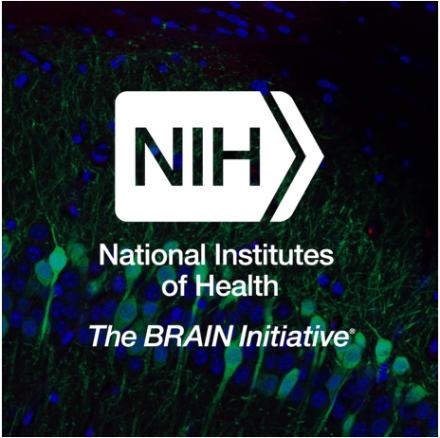The BRAIN Initiative congratulates Dr. Nancy Kanwisher, Dr. Winrich Freiwald, and Dr. Doris Tsao, co-recipients of the 2024 Kavli Prize in Neuroscience. Together with Dr. A. Paul Alivisatos, this year’s co-recipient of this year’s Kavli Prize in Nanoscience, Drs. Freiwald and Tsao have contributed to the BRAIN Initiative through their science and visionary perspectives.
News

BRAIN News Spotlight
Researchers Fully Map Neural Connections of the Fruit Fly Brain
NIH-supported milestone will advance understanding of brain processes in larger animals.
View Spotlight Article- Human Neuroscience
- Neuroimaging Technologies Across Scales
- Systems Neuroscience
NIH-funded researchers have been working to restore movement to people living with paralysis. This special Research in Context feature explores the different experimental approaches scientists are developing, including BRAIN-funded researcher Dr. Marco Capogrosso, a neuroscientist at the University of Pittsburgh, to allow people without control of their body’s movements to become more independent and improve their quality of life.
- Human Neuroscience
- Neural Recording & Modulation
The 10th Annual BRAIN Initiative Conference: Celebrating a Decade of Innovation will convene the BRAIN Initiative community to acknowledge this important milestone. Attendees will come together to discuss and learn about the latest discoveries in neuroscience in the spirit of the Initiative’s ambitious mission to revolutionize our understanding of the human brain and to accelerate this knowledge into the development of innovative technologies to improve how we treat, prevent, and cure disorders of the brain. This conference is open to the public.
- Data Science & Informatics
- Dissemination
- Human Neuroscience
- Neural Recording & Modulation
- Neuroethics
- Neuroimaging Technologies Across Scales
- Systems Neuroscience
- Tools/Tech for Brain Cells/Circuits
- Training
John Ngai, director of the U.S. National Institutes of Health’s BRAIN Initiative, and U.S. Rep. Bonnie Watson Coleman visited in May with Princeton Neuroscience Institute (PNI) researchers to discuss recent advances toward understanding the fundamental workings of the brain.
- Data Science & Informatics
- Tools/Tech for Brain Cells/Circuits
In this new NIH-supported study, researchers implanted such a device in a brain area known to be important for representing spoken words called the supramarginal gyrus in two people with tetraplegia, a condition marked by full body paralysis from the neck down due to cervical spinal cord injury. The researchers found that the device could decode several words the participants “spoke” only in their minds. While we are far from using such a device to decode whole sentences or even phrases, and the exact mechanisms of internal speech are still under study, the findings, reported in Nature Human Behavior , are notable because it had been unclear whether the brain signals involved in thinking words could be reproducibly translated. The study was supported by the NIH Brain Research Through Advancing Innovative Neurotechnologies® (BRAIN) Initiative Research Opportunities in Humans program.
- Human Neuroscience
- Systems Neuroscience
The NIH Brain Research Through Advancing Innovative Neurotechnologies® (BRAIN) Initiative has expanded scientists’ understanding of the human brain in recent years, offering fascinating insights into the ways that individual cells and complex neural circuits interact dynamically to enable us to think, feel, and act. But neuroscientists still have much more to learn about how our brains are put together at the most fundamental, subcellular level. As a step in that direction, in a new study supported in part by the NIH BRAIN Initiative and reported in the journal Science , researchers have created the most detailed nanoscale resolution map ever produced of a cubic millimeter of brain tissue, about the size of half a grain of rice.
- Dissemination
- Human Neuroscience
- Neuroimaging Technologies Across Scales
- Systems Neuroscience
- Tools/Tech for Brain Cells/Circuits
Researchers have, for the first time, visualized the full network of blood vessels across the cortex of awake mice, finding that blood vessels rhythmically expand and contract leading to “waves” washing across the surface of the brain. These findings, funded by in part by the National Institutes of Health Brain Research Through Advancing Innovative Neurotechnologies® Initiative, or The BRAIN Initiative®, improve the understanding of how the brain receives blood, though the function of the waves remains a mystery.
- Systems Neuroscience
NIH-funded atlas characterizes over 32 million cells across the mouse brain.
- Tools/Tech for Brain Cells/Circuits
Incredibly detailed cell maps help pave the way for new generation of treatments
- Data Science & Informatics
In the human brain, 86 billion neurons form more than 100 trillion connections with other neurons at junctions called synapses. Scientists are now working on an ambitious effort to develop technologies to map these connections across the brain, from mice to humans.
- Human Neuroscience
- Neural Recording & Modulation
- Neuroimaging Technologies Across Scales
- Tools/Tech for Brain Cells/Circuits
In the News
The BRAIN Initiative Alliance (BIA) aims to spread the word about BRAIN-funded scientific advancements. Visit the BIA website for up-to-date news coverage about the impact of BRAIN Initiative research.
The BRAIN Blog
The BRAIN Blog covers updates and announcements on BRAIN Initiative research, events, and news. Hear from BRAIN Initiative trainees, learn about new scientific advancements, find out about recent funding opportunities, and more.
